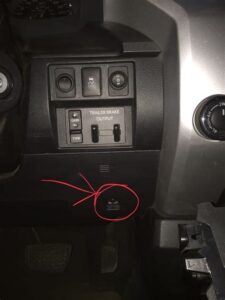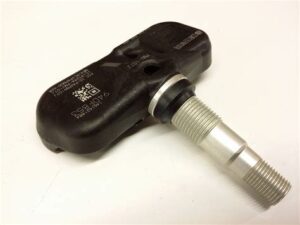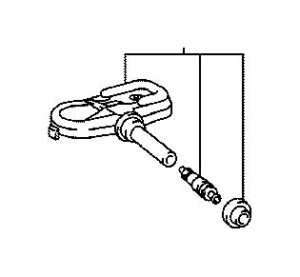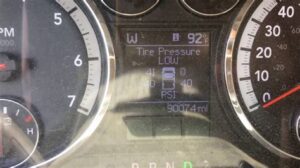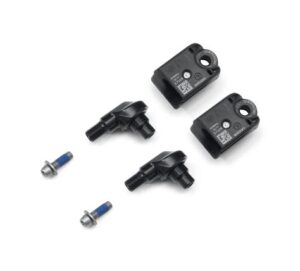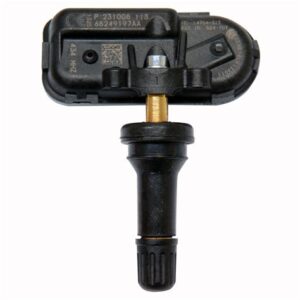Explore the significance of GM trailer tire pressure sensors, their functionality, benefits, and essential maintenance tips for optimal performance and safety.When it comes to towing, safety and performance are paramount. One often overlooked aspect of trailering is the importance of tire maintenance, specifically tire pressure. GM trailer tire pressure sensors are designed to keep you informed about the health of your tires, enhancing your overall towing experience. In this blog post, we’ll explore the ins and outs of GM trailer tire pressure sensors, starting with how they fit into the larger picture of tire management. We’ll highlight why maintaining proper tire pressure is crucial for both safety and fuel efficiency. Additionally, we’ll delve into the mechanics of how these sensors operate and the myriad benefits they offer to trailer owners. To wrap up, we’ll share some essential tips for keeping your GM trailer tire sensors in top shape. Join us as we navigate the world of trailer tire safety and maintenance.
Understanding GM Trailer Tire Pressure Sensors
The GM Trailer Tire Pressure Sensors are an essential component designed to monitor the tire pressure of your GM trailer. These sensors play a crucial role in ensuring safety and optimal performance while on the road. Understanding their functionality and importance can help you maintain your trailer in the best possible condition.
GM trailer tire pressure sensors work by constantly measuring the air pressure within each tire. This information is then relayed to the vehicle’s onboard computer system, providing the driver with real-time data about tire conditions. A critical aspect of this system is that it can alert the driver when the tire pressure falls below the recommended levels, which is vital in preventing blowouts and improving fuel efficiency.
How GM Trailer Tire Pressure Sensors Operate
The functionality of these sensors is based on advanced technology that involves the following:
- Pressure Measurement: Each sensor contains a pressure transducer that converts pressure levels into an electronic signal.
- Data Transmission: The sensors wirelessly transmit this information to the vehicle’s Tire Pressure Monitoring System (TPMS).
- Warning Alerts: When a tire’s pressure is too low, the system triggers a warning light on the dashboard or an alert tone, informing the driver of the issue.
The Significance of GM Trailer Tire Pressure Sensors
Maintaining the correct tire pressure is not only important for the safety of your vehicle but also enhances its overall performance. Here are some benefits of keeping a close eye on tire pressure:
- Improved Fuel Efficiency: Proper tire pressure can lead to better fuel economy.
- Increased Tire Longevity: Regular monitoring helps prevent premature tire wear.
- Enhanced Safety: Reduces the risk of tire blowouts, keeping you and your cargo safe.
Conclusion
In summary, understanding GM Trailer Tire Pressure Sensors is key to maintaining your trailer’s performance and safety. These sensors are not simply optional features; they are vital tools that provide peace of mind and enhance your driving experience.
Importance of Proper Tire Pressure
Maintaining the proper tire pressure is vital for both safety and performance when it comes to your GM trailer. Tire pressure affects various aspects of driving, from fuel efficiency to the longevity of your tires. Here are several reasons why ensuring your tires are inflated to the recommended pressure is crucial:
- Safety: Under-inflated tires can lead to blowouts or loss of control while towing. Ensuring your tire pressure is at the right level significantly reduces the risk of accidents.
- Fuel Efficiency: Tires that are inflated to the correct pressure improve your trailer’s fuel efficiency. Properly inflated tires reduce rolling resistance, which translates to better gas mileage.
- Tire Longevity: Keeping tires at the proper pressure can extend their lifespan. Over-inflation and under-inflation cause uneven wear, leading to premature tire replacement.
- Improved Handling: Correct tire pressure enhances your vehicle’s handling, especially when cornering or during sudden stops. This is especially critical when towing heavy loads.
| Tire Pressure Level | Effect on Performance |
|---|---|
| Under-Inflated | Increases risk of blowouts, reduces fuel efficiency, and causes uneven tire wear. |
| Properly Inflated | Enhances safety, improves fuel efficiency, and extends tire life. |
| Over-Inflated | Can lead to a harsh ride, increased wear in the center of the tread, and increased risk of punctures. |
In summary, proper tire pressure is not just about performance — it’s also a fundamental part of ensuring safety on the road. Regular monitoring and adjustment of your GM trailer’s tire pressure can lead to a smoother, safer towing experience.
How GM Trailer Tire Sensors Work
GM Trailer Tire Pressure Sensors play a crucial role in maintaining the safety and performance of your trailer. These sensors are designed to monitor the tire pressure of your trailer in real-time, providing you with valuable information that can prevent accidents and enhance the longevity of your tires.
Functionality of GM Trailer Tire Sensors
The GM trailer tire sensors utilize a combination of technology to ensure accurate monitoring of tire conditions. Here’s how they work:
- Pressure Detection: Each sensor is equipped with a pressure monitoring device that measures the air pressure within the tire.
- Temperature Measurement: In addition to pressure, these sensors also monitor the temperature of the tire. This is critical as high temperatures can indicate issues like under-inflation.
- Wireless Transmission: The data collected from the sensors is transmitted wirelessly to the vehicle’s onboard computer system, which displays the information to the driver.
Data Interpretation
Once the sensor data reaches the vehicle’s system, it is interpreted and displayed in real-time to the driver. This feature enables immediate assessments of tire health, allowing drivers to take necessary actions if tire pressure is low or too high. Here’s a breakdown of the data delivered:
| Sensor Status | Indication |
|---|---|
| Normal Pressure | Green Indicator Light |
| Low Pressure | Yellow Indicator Light |
| Critical Pressure | Red Indicator Light |
Maintenance and Care
To ensure the long-lasting performance of your GM trailer tire sensors, regular maintenance is essential. Users should periodically check the sensor batteries and ensure that the sensors are properly calibrated. By doing so, you can keep the sensors functioning optimally and prolong their lifespan.
Final Thoughts
The innovative technology behind GM trailer tire pressure sensors helps ensure your safety on the road. By providing real-time data and alerts, these sensors empower drivers to make informed decisions regarding tire care.
Benefits of GM Trailer Tire Pressure Sensors
In the world of towing and trailering, maintaining proper tire pressure is essential for safety and efficiency. One of the invaluable tools for achieving this is the GM Trailer Tire Pressure Sensors. Here are the key benefits of utilizing these sensors:
- Enhanced Safety: Proper tire pressure is critical for safe towing. Tire pressure sensors alert drivers to under-inflated or over-inflated tires, reducing the risk of blowouts and accidents.
- Improved Fuel Efficiency: Maintaining optimal tire pressure ensures that your trailer rolls smoothly. This can lead to better fuel efficiency, saving you money in the long run.
- Prolonged Tire Life: Consistent monitoring helps to prevent uneven wear and extends the lifespan of your tires, allowing you to get the most out of your investment.
- Real-time Monitoring: GM Trailer Tire Pressure Sensors provide real-time data directly to your vehicle’s dashboard, allowing you to make timely decisions while on the road.
- Convenience: Forgetting to check tire pressure manually can lead to issues down the line. With these sensors, you have the convenience of automatic monitoring, freeing you from the hassle of routine checks.
- Improved Handling: Properly inflated tires lead to better vehicle handling. This is especially crucial when towing heavy loads where precision and control matter.
- Cost-effective Solution: While there may be an initial investment in the sensors, the long-term savings from preventing tire damage and improving fuel efficiency make it a cost-effective solution.
In summary, the GM Trailer Tire Pressure Sensors provide not only peace of mind but also tangible benefits that enhance both safety and performance on the road.
Tips for Maintaining GM Trailer Tire Sensors
Maintaining your GM trailer tire pressure sensors is crucial for ensuring optimal performance and safety. Proper care and attention to these sensors can help you avoid potential tire issues and enhance the lifespan of your trailer tires. Here are some handy tips for keeping your GM trailer tire sensors in top shape:
1. Regular Inspection
Conduct regular inspections of your tire pressure sensors, particularly before long journeys or heavy-load towing. Check for:
- Visible damage to the sensors
- Loose connections or wiring issues
- Signs of corrosion
2. Maintain Proper Tire Pressure
Ensure that your trailer tires are inflated to the manufacturer’s recommended tire pressure. Use a reliable tire pressure gauge to check the pressure at least once a month and before long trips. Maintaining the correct pressure helps the sensors function accurately.
3. Keep Sensors Clean
Debris and dirt can interfere with the performance of GM trailer tire sensors. Regularly clean the sensor area and ensure that there are no obstructions. A simple wipe with a damp cloth can make a difference.
4. Replace Batteries as Needed
If your trailer tire pressure sensors use batteries, make sure to check and replace them as required. A weak battery can lead to inaccurate readings and sensor failure.
5. Monitor for Warning Alerts
Pay attention to any alerts on your dashboard related to tire pressure. If you receive a warning, check the tire pressure immediately. Ignoring these alerts can lead to serious tire issues.
6. Professional Maintenance
Consider having your GM trailer tire sensors checked by a professional during regular vehicle maintenance. Technicians can identify any underlying issues and ensure everything is functioning properly.
By following these tips, you can ensure that your GM trailer tire pressure sensors remain effective, helping to maintain tire performance and safety on every haul. Remember that a little attention goes a long way in extending the life of your trailer tires!
Frequently Asked Questions
What are GM trailer tire pressure sensors?
GM trailer tire pressure sensors are devices installed in or on the trailer tires that monitor and report the tire pressure to the vehicle’s onboard computer system.
Why is maintaining proper tire pressure important for trailers?
Maintaining proper tire pressure is crucial for trailers as it enhances safety, improves fuel efficiency, and prolongs the lifespan of the tires.
How do GM trailer tire pressure sensors work?
GM trailer tire pressure sensors work by measuring the air pressure inside the tire and transmitting that data wirelessly to the vehicle’s dashboard display.
Can I install GM trailer tire pressure sensors on my own?
Yes, while it is possible to install GM trailer tire pressure sensors on your own, it is recommended to consult a professional or refer to the manufacturer’s instructions for proper installation.
What should I do if my tire pressure sensor alerts me?
If your tire pressure sensor alerts you, check the tire pressure immediately and inflate the tires to the recommended pressure, or inspect for leaks or damage if the pressure is still low.
How often should I check trailer tire pressure?
It is advisable to check trailer tire pressure before each trip and to regularly monitor it during long journeys to ensure safety and performance.
Are there any benefits to using GM trailer tire pressure sensors over traditional methods?
Yes, GM trailer tire pressure sensors provide real-time monitoring, alerts for low pressure, and help prevent issues like blowouts or uneven tire wear, which traditional methods may not detect until it’s too late.
